
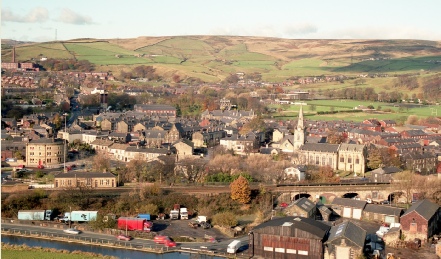
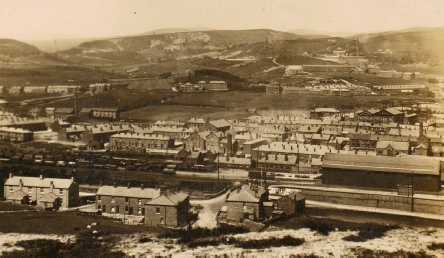
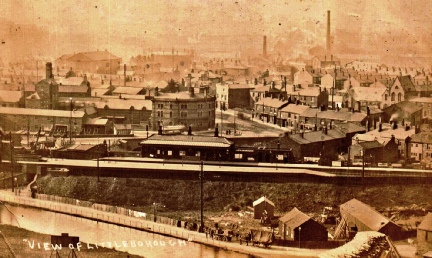
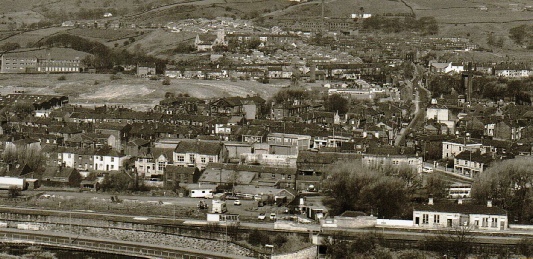


Littleborough Mills
There were around 60 textile mills in Littleborough, many of which started as woollen mills but later turned to cotton. There was also a Rayon Mill. In addition, there were over 30 mills associated with the finishing of the textile products. The latter included Fulling mills, dye works and later factories which applied modern finishes to the cloth. Not all of the mills existed at the same time. As it would be difficult to detail all on this site, a selection of now closed mills is included.
Use these links to reach a particular mill etc.
Longden End Mill Uber Mill Frankfort Mill Whitelees Mill
A couple of other now demolished mills are:-
Town House Mill & Croft Head Mill.
Longden End Mill was a Fulling mill built at a date unknown by Emanuel Clegg who had another mill in Milnrow. It was certainly in existence in 1853 but by 1861 it was operated by Joseph Clegg (a farmer). The family later left Longden End and set up Rakewood Upper Mill which is still operating as processors of finished cloth. After they left the mill was taken over by John Leach but by 1906 it had succumbed to fire.
Uber Mill was opened in 1863 and was located next to Durn Bridge and the Rochdale Canal being a typical 19th century stone built cotton mill. In 1893 it converted to making confectionery and when that failed in reopened as Victoria Bleaching and Dying Works. It burnt down late September 1916, was demolished and never rebuilt. A local garage now occupies part of the site.
Frankfort Mill was built in 1861 for £30,000 with a further £20,000 spent on equipping it with modern machinery. The mill operated from 1865 until 1895 during which time a great fire broke out (a recurring theme) in 1872 and during the clean-up operation a great storm knocked down three storeys of the damaged gable and killed 4 female members of the workforce.
In 1878 Littleborough Co-op Manufacturing Co Ltd arranged a £12,000 mortgage with the Littleborough Society and a year later the MacDonald’s directory has the mill as being under Littleborough Manufacturing Co., cotton spinners and manufacturers with Robert Taylor as manager. The mill closed again in 1887 due to financial mismanagement, the Littleborough Co-operative Society incurring a total loss of £22,000. Later in 1887 the mill was auctioned off and the Littleborough Society had no further involvement. The mill continued with different enterprises but most failed.
In 1894 it was converted to soft drinks manufacture and then other products. During the Second World War it was used as a supply depot by the Ministry of Supply. It was later involved in the building and painting of truck bodies.
After closure and demolition, it was for many years a vehicle scrap yard which later concentrated on lorries, vans etc. After that closed planning approval was finally given for a new housing development and work started but came to an end and the site lay almost abandoned for some years (in line with earlier history of failure). A new developer took over the site and previously built foundations were cleared away and the site levelled with hardcore before the new houses were built over 2018/9.
In 1818 there is an entry in J Leigh’s directory concerning James Taylor, Flannel Manufacturer at White Lees. Unfortunately it doesn’t confirm if White Leeds was where he had a factory or lived. The mill was at some stage a Bleach Mill.
An interesting fact is that in 1841 John Petrie of Rochdale delivered their 47th beam engine to Mr John Hurst of Whitelees Mill. In 1845 a Spinning Mule was erected in a room over the Whitelees Factory. Whilst it spun cotton for many years it later became involved in cotton dyeing and finishing.
The mill was mothballed during WW2 and closed near the end of the war. When the CWS took over in 1957 they decided to dispose of the engine. The (Engine was Preserved by Reynold. S engineering in Rochdale for many years but is now in Ellenroad (Mill) Engine House.
A letter from Co-op stated that few records were kept on buildings owned, closed and or demolished in the 1960s or later. Once the mill was demolished the site was used for housing
Uber Mill is next to the canal at the front with Frankfort Mill behind
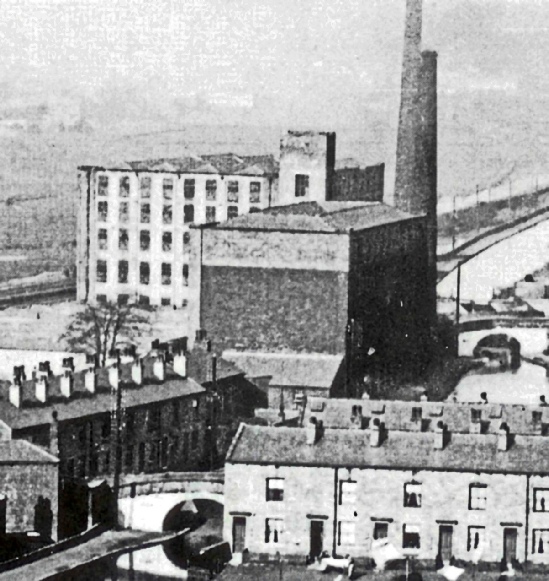

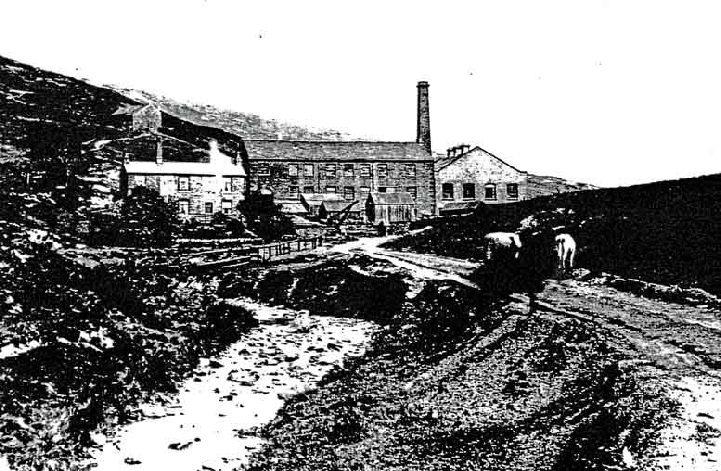
Longden End Mill
Whitelees Mill (Above)
| Contact Us |
| Rechabites |
| Early Schools |
| Non-conformist schools |
| C of E and RC Schools |
| Board and Local Authority Schools |
| Richard Jay - Coach Operator |
| William Burrill |
| Richard Jay Haukier |
| Leach - Cycles to Haulage |
| H M Sutcliffe |
| J Grindrod & Son Ltd |
| R Rudge and Son Ltd |
| Canal Restoration |
| Clegg Hall & Smithy Bridge |
| Railways in Littleborough Centre |
| Littleborough Viaduct to Summit Tunnel |
| Summit Tunnel |
| Industrial Railways |
| Blackstone Edge Turnpike |
| Calderbrook Turnpike |
| Doghill to Steanor Bottom Turnpike |
| Todmorden Rd TP |
| Toll Roads |
| Industrial Histories |
| History Trails |
| Littleborough Book |
| Pubs & Inns |
| Co-op - Early Grpwth |
| Coop - Central Premises & Competition |
| Coop in 20th Century |
| Coop Decline & Change |
| LANCTAN |
| Schofield Iron Woks |
| Phoenix Iron Works |
| Clegg's Shore Mills |
| Consterdine textile Mills |
| Schofield Textile Mills |
| Rayon (Artificial Silk( Manufacture |
| Mills |
| Deanhead Chemical Works |
| Akzo Chemical Works |
| Starring Pottery |
| Summit Brickworks |
| Tetlows Pottery |
| Whittaker Pottery |
| Coal Mining Map |
| Starring Clay and Coal Mine |
| Cleggswood Colliery |
| Mining around Hollingworth |
| Shackleton - Coal Merchant |
| Possible Roman Littleborough |
| Blackstone Edge Roman Road |
| Roll of Honour |
| WW2 Heroes |